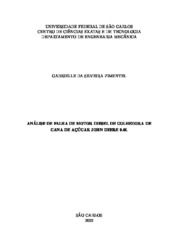| dc.contributor.author | Pimentel, Gabrielle da Silveira | |
| dc.date.accessioned | 2022-10-05T13:00:19Z | |
| dc.date.available | 2022-10-05T13:00:19Z | |
| dc.date.issued | 2022-04-30 | |
| dc.identifier.citation | PIMENTEL, Gabrielle da Silveira. Análise de falha de motor diesel de colhedora de cana de açúcar John Deere 9.0L. 2022. Trabalho de Conclusão de Curso (Graduação em Engenharia Mecânica) – Universidade Federal de São Carlos, São Carlos, 2022. Disponível em: https://repositorio.ufscar.br/handle/ufscar/16802. | * |
| dc.identifier.uri | https://repositorio.ufscar.br/handle/ufscar/16802 | |
| dc.description.abstract | Automotive maintenance is understood as the set of techniques and processes responsible for enabling a
machinery performs its designated functions. Analysis of agricultural equipment failures in
juice energy companies, such as Raízen, is a strategy that helps to reduce the cost of loss and/or damage to parts, since, once the problem is known, it is possible to draw up action plans to prevent it from occurring in the future. However, to be assertive, it is necessary to investigate the various components that make up the analyzed mechanical system. In this course conclusion work, the failure study of one of the key components for the operation of a harvester will be made: the diesel engine. The investigation will aim to identify the most frequent causes of failure of this engine and prevent the repetition of this fact in other parts. For this, the analysis will be based on the identification of damaged engine components, identification of impurities in the used lubricating oil, as well as the history of preventive and corrective maintenance already carried out. To gather and organize the information in priority, and to manage the study in a purposeful way, the Ishikawa management tool will be used. At the end of the study, it is expected to find the reason that caused the engine to fail, as well as to identify the GAP's or gaps that until then were not investigated and became a problem for the proper functioning of the engine, so that plans can be drawn up later. assertive actions in the programming of the component in question. | eng |
| dc.description.sponsorship | Não recebi financiamento | por |
| dc.language.iso | por | por |
| dc.publisher | Universidade Federal de São Carlos | por |
| dc.rights | Attribution-NonCommercial-NoDerivs 3.0 Brazil | * |
| dc.rights.uri | http://creativecommons.org/licenses/by-nc-nd/3.0/br/ | * |
| dc.subject | Análise de falha | por |
| dc.subject | Manutenção | por |
| dc.subject | Motor | por |
| dc.subject | Failure analysis | eng |
| dc.subject | Maintenance | eng |
| dc.subject | Engine | eng |
| dc.title | Análise de falha de motor diesel de colhedora de cana de açúcar John Deere 9.0L | por |
| dc.title.alternative | Failure analysis of a diesel engine from a John Deere 9.0L sugar cane harvester | eng |
| dc.type | TCC | por |
| dc.contributor.advisor1 | Shiki, Sidney Bruce | |
| dc.contributor.advisor1Lattes | http://lattes.cnpq.br/0573973677787523 | por |
| dc.description.resumo | Entende-se por manutenção automotiva o conjunto de técnicas e processos responsáveis por possibilitarem que um
maquinário execute suas funções pelas quais foi designado. A análise de falhas de equipamentos agrícolas em
empresas suco energéticas é uma estratégia que auxilia na redução de custo com perdas e/ou danos de peças, já que, uma vez conhecido o problema ou as possíveis causas raízes, é possível traçar planos de ação para evitar e que o mesmo ocorra futuramente. Contudo, para ser assertivo, é preciso investigar os vários componentes que compõem o sistema mecânico analisado. No presente trabalho de conclusão de curso, foi feito o estudo da falha de um dos componentes primordiais para o funcionamento de uma colhedora: o motor a diesel. A investigação terá o objetivo de identificar as causas mais frequentes de falhas desse motor e prevenir a repetição desse fato em outras peças. Para isso, a análise será feita baseada na identificação dos componentes danificados do motor, identificação de impurezas no óleo lubrificante utilizado, bem como no histórico de manutenções preventivas e corretivas já realizadas. Para reunir e organizar as informações em prioridade, e fazer a gestão do estudo de modo propositivo, a ferramenta de gestão conhecida como diagrama de Ishikawa ou espinha de peixe será usada. Ao final do estudo, espera-se encontrar o motivo que levou o motor a falha, bem como identificar lacunas que até então não eram averiguadas e se tornaram um problema para o bom funcionamento do motor, para, posteriormente, ser traçado planos de ação mais assertivos na programação do componente em questão. | por |
| dc.publisher.initials | UFSCar | por |
| dc.subject.cnpq | ENGENHARIAS::ENGENHARIA MECANICA::PROJETOS DE MAQUINAS | por |
| dc.publisher.address | Câmpus São Carlos | por |
| dc.contributor.authorlattes | http://lattes.cnpq.br/7075495217489053 | por |
| dc.publisher.course | Engenharia Mecânica - EMec | por |

